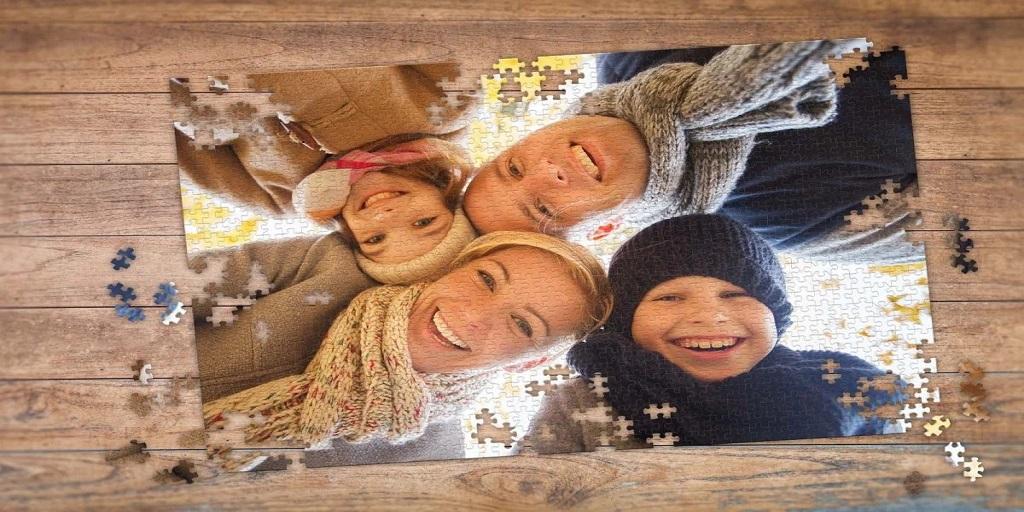Introducing Jigsaw Puzzles to Toddlers

Introducing puzzles and games to toddlers can be a joyful and enriching experience, especially when done with a custom puzzle tailored to their abilities and interests. Customized puzzles offer an ideal starting point for toddlers, providing just the right mix of challenge, familiarity, and engagement to help build their problem-solving skills, hand-eye coordination, and confidence.
So instead of overwhelming a young child with a random or overly complex puzzle, a custom puzzle offers a focused, supportive entry into the world of puzzling—making it the best way to begin.
Create a Puzzle That Matches Their Developmental Stage
One of the greatest advantages of using a custom puzzle is its ability to align with a toddler's developmental stage. Young children are still mastering the use of their hands and fingers for fine motor tasks.
A well-designed puzzle can have large, chunky pieces that are easy for little hands to grip and maneuver. For example, a two-piece puzzle featuring realistic, easily recognizable images—like a pig, car, or favorite animal—is perfect for a toddler just beginning their puzzle journey.
These pieces not only fit together physically but also make cognitive sense, offering a logical beginning and end that toddlers can grasp visually and mentally.
Customized puzzles can also remove unnecessary complexity that might frustrate a young child. For instance, double-sided puzzles or pieces with ambiguous colors or shapes can confuse a toddler.
But a customized puzzle for toddlers can be designed with one-sided images, bold outlines, and distinct shapes, helping the child understand when a piece fits correctly. This built-in “control of error” gives toddlers immediate feedback, which is crucial at this age when they are still learning how to self-correct and build persistence.
Choose Themes and Images They Love
Another standout benefit of customizing puzzles is the ability to tailor the theme to match the child’s interests. You can choose animals, vehicles, or a puzzle featuring their beloved toys. Those images will immediately grab their attention and make the experience more enjoyable.
Children naturally engage more deeply with content that reflects their curiosity. If your child loves farm animals, a puzzle that matches baby animals with their parents can turn a basic game into a meaningful learning opportunity.
This thematic approach supports vocabulary development, cognitive association, and the early stages of abstract thinking.
Design Puzzles for Skill-Building
Custom puzzles also support progressive skill-building. You can design a series of puzzles that gradually increase in difficulty, starting with two pieces, then four, six, eight, and so on. This scaffolding approach allows toddlers to master foundational skills before moving on to more complex configurations.
As their abilities grow, they can work on building entire scenes—learning how to organize their thoughts, sort pieces, and work through challenges incrementally. These small achievements build a strong sense of confidence and reinforce the idea that effort leads to success.
This flexibility in difficulty is another reason customizing puzzles is effective. You can adjust how many pieces are presented to the child at any time, limiting the options for beginners and expanding them as the child becomes more proficient.
You can start by offering just a few pieces—maybe only one or two animals to match—then gradually increase the number to provide more of a challenge. This adjustable setup prevents frustration while still encouraging growth.
Family Quality Time with Puzzles
Using customized puzzles also presents a wonderful opportunity for shared activity. While independent play is valuable, puzzles can also be a deeply collaborative and social experience. Sitting down with your child to complete a puzzle fosters communication, teamwork, and emotional bonding.
Furthermore, a custom puzzle can incorporate practical learning strategies like sorting and categorizing. Parents can separate puzzle pieces by theme, color, or feature—such as wheels, animal heads, or body parts—so the child can focus on smaller sections before building the full picture.
Ultimately, customizing a puzzle for your toddler offers a highly effective, adaptable, and enjoyable way to introduce them to jigsaw puzzles and other games. Custom puzzles turn the learning process into a fun, confidence-building adventure that toddlers can enjoy again and again.
For more information about Custom Photo Puzzle and Personalized Puzzles Please visit: MakeYourPuzzle.
- Art
- Causes
- Crafts
- Dance
- Drinks
- Film
- Fitness
- Food
- Games
- Gardening
- Health
- Home
- Literature
- Music
- Networking
- Other
- Party
- Religion
- Shopping
- Sports
- Theater
- Wellness



